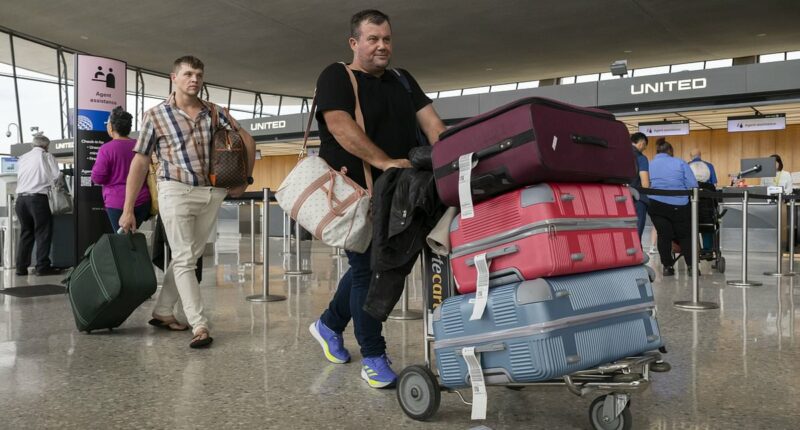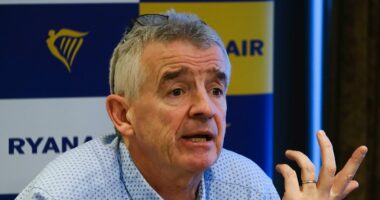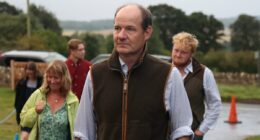Share this @internewscast.com

A white South African granted refugee status in America after Donald Trump deemed him a victim of racial discrimination has praised the country’s work ethic as he settles into life in the US. The first batch of 59 Afrikaners, a white minority in South Africa , who opted to flee for the US arrived in May after the White House fast-tracked their refugee applications. Afrikaners descend from predominantly Dutch settlers and dominated the South African government which introduced apartheid – a system of racist segregation that was scrapped in 1994. Three decades on the majority of the country’s best farmland remains in white hands.

But in February, President Trump signed an executive order giving them refugee status after he and South African-born Elon Musk claimed there was a ‘genocide’ of white farmers in the African nation – an unfounded claim which has been widely discredited. However, South African President Cyril Ramaphosa did sign a contentious law in January allowing the government to seize privately owned land without compensation when it is deemed ‘equitable and in the public interest’. Nevertheless, the move was particularly controversial given other refugees, from countries including Afghanistan , have had their Temporary Protected Status removed by the Trump administration.

Just one more group of Afrikaners have arrived three months after the first batch arrived in the US. Others have applied and are awaiting the results of their applications. But those who have already moved are enjoying their new surroundings. Charl Kleinhaus, a farmer who was first sent to Buffalo, New York in May, before moving his family to a farm in South Dakota, has been impressed by the America work ethic. ‘The farmers here work. I’ve not seen any farm owner who works like American farmers,’ he said in a video shared on the Amerikaners Facebook page, a group sharing information about moving to the US.

‘They really, really work hard, until ten, eleven o’clock at night, early in the morning they start. There’s no hands here that you whistle to come sweep the floors, or wash the tractor … the farmer does it all himself,’ Kleinhaus said. In South Africa most farmers employ a crew of low paid workers to help with labour. A large number of domestic workers are also employed. There are estimated to be 850,000 domestic workers out of a population of around 64 million. Mr Kleinhaus added that in the US ‘there’s no kitchen lady you call to sweep the house, or clean the house, or stuff like that. You do the work yourself.’ He said the benefit of this was that maids can’t steal from you.

‘Things at your house don’t disappear. Your sugar doesn’t go away, your coffee doesn’t go away.’ Mr Kleinhaus, a Trump supporter, previously came under fire for antisemitic posts on social media, which have since been deleted. The 46-year-old ran a failed quarry business in Limpopo, a northern province which borders Botswana, Zimbabwe and Mozambique. He claimed he had been ‘threatened’ by black people who said they wanted to take his land. He alleged that he received messages stating ‘we’ll get rid of you, you’re on my land’ and ‘We are coming for you, you better be awake’.

Mr Kleinhaus also said local police failed to act sufficiently when his farming machinery was damaged. Ramaphosa described the group of Afrikaner refugees as ‘cowards’, adding that they do not want to address inequalities created by the apartheid era. ‘As South Africans, we are resilient,’ he said in May. ‘We don’t run away from our problems. We must stay here and solve our problems.’ Agriculture Minister John Steenhuisen, a white South African, said the refugees were ‘making a mistake’ and the country was not experiencing a genocide or land expropriation without compensation.

The status of white South African farmers has been a rallying cry for right and far-right American politicians and President Trump grilled his South African counterpart Ramaphosa on the topic when he visited the White House in May. Ramaphosa had travelled to Washington D.C. in the hopes of improving the country’s relationship with Trump after he cancelled aid to the nation, expelled the South African ambassador and offered refuge to white minority Afrikaners.

But Trump humiliated Ramaphosa, asking aides to dim the lights in the Oval Office as he played a supercut of speeches from radical opposition party leader Julius Malema, of the Economic Freedom Fighters party, whose trademark song at rallies is ‘Shoot the Boer, Shoot the farmer’. Trump showed other clips that purported to show evidence of a ‘white genocide’ in the country.







